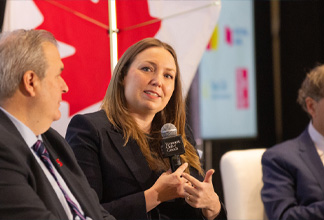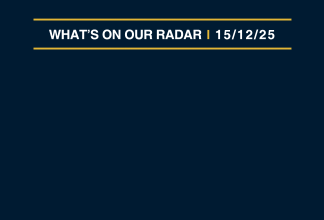An Expert Shares 4 Ways to Reduce Stress Amid Uncertainty
Written by Natalie Stechyson
Published on February 15, 2022
minute read
Share:
While we're not yet living in a fully post-pandemic world, there are definitely signs that change is underway.
Some Canadian provinces are beginning to ease coronavirus public-health measures, and several others have revealed frameworks to do the same. Canadians are also making plans to travel abroad again, and industry groups are predicting couples will tie the knot in record numbers this year, at levels not seen since the 1980s. In markets, some companies that fared very well over the past two years — the so-called "pandemic darlings" — are seeing their share prices slip.
For Canadians who have observed similar signs before and dared to hope for an end to the pandemic, the news may be cause for optimism. For others, it may bring on additional worries.
“Anxiety is really about the fear of the unknown," says Toronto-based registered psychotherapist Jhanelle Peters — and for nearly two years, Canadians have had to face the unknown over and over again. "If you sit in that unknown long enough, well, it can get pretty lonely, and it can get pretty low, and that's when the depression piece comes in."
Not knowing when pandemic restrictions might lift for good, when infection rates might decrease or how your finances might be affected can cause anxiety to skyrocket, says Peters. It's a perfect storm to wreak havoc on Canadians' mental health.
You're not alone if you're feeling distressed, fatigued or stuck in place. An ongoing series of polls by Mental Health Research Canada (MHRC) found that the number of Canadians reporting high anxiety levels has nearly tripled (24 per cent) since the COVID-19 outbreak began, while the number reporting high depression levels has more than doubled (15 per cent). Of more than 3,700 Canadians polled, almost one in four reported their mental health has impaired their ability to function — impacting their social and family life, in particular.
As the pandemic landscape continues to evolve, Peters offers some timely tips on ways Canadians can invest in their mental health.
Set firm financial boundaries
Job loss or insecurity, as well as trouble making ends meet, have been major contributors for anyone whose mental health has been negatively impacted by the pandemic-induced economic downturn.
“If your mental health is not in a good space, sometimes it causes people to spend more," says Peters, so it's especially important to set firm financial boundaries. Stick to a budget and spend within your means to avoid additional financial strain.
Go with the season
Getting outside has had the most positive impact on the mental health of Canadians — more than exercise, reading or other forms of entertainment, according to the MHRC poll. Darker days and colder temperatures may increase risk of depression, so it can help to have a plan.
When spring and summer arrive and the days grow longer, be intentional about making the most of those precious daylight hours, she adds. Even just taking five or 10 minutes outside when the sun is shining can make you feel brighter.
Connect with others to combat isolation
The MHRC poll found social isolation continues to have a dominant negative impact on the mental health of Canadians, on par with the possibility of losing one's job or contracting the coronavirus. And the effects of prolonged isolation are expected to be felt long after restrictions end.
“The one thing we all need is that little bit of connection," Peters says.
If you're feeling isolated, ask yourself what it is you're missing, Peters says. If it's the experience of being around other people, try leaving your house and going to a park, coffee shop or restaurant.
If it's a deeper connection you crave, reach out to your friends and colleagues, even if you haven't talked as much since the pandemic started, Peters adds. They're likely feeling just as cut off, and a conversation could re-spark that relationship.
Have some compassion (for yourself)
After the ups and downs of the last nearly two years, it can be hard to trust positive signs that the pandemic will end one day. About two-thirds of Canadians in the MHRC poll said they feel hopeful "always or "most of the time" about their future.
So, remember to have some compassion for yourself, Peters says. After all, we've been through a lot, the days are challenging and we are all just doing our best.
“Your best is going to look different on different days," she says.
RBC Direct Investing Inc. and Royal Bank of Canada are separate corporate entities which are affiliated. RBC Direct Investing Inc. is a wholly owned subsidiary of Royal Bank of Canada and is a Member of the Investment Industry Regulatory Organization of Canada and the Canadian Investor Protection Fund. Royal Bank of Canada and certain of its issuers are related to RBC Direct Investing Inc. RBC Direct Investing Inc. does not provide investment advice or recommendations regarding the purchase or sale of any securities. Investors are responsible for their own investment decisions. RBC Direct Investing is a business name used by RBC Direct Investing Inc. ® / ™ Trademark(s) of Royal Bank of Canada. RBC and Royal Bank are registered trademarks of Royal Bank of Canada. Used under licence.
© Royal Bank of Canada 2022.
Any information, opinions or views provided in this document, including hyperlinks to the RBC Direct Investing Inc. website or the websites of its affiliates or third parties, are for your general information only, and are not intended to provide legal, investment, financial, accounting, tax or other professional advice. While information presented is believed to be factual and current, its accuracy is not guaranteed and it should not be regarded as a complete analysis of the subjects discussed. All expressions of opinion reflect the judgment of the author(s) as of the date of publication and are subject to change. No endorsement of any third parties or their advice, opinions, information, products or services is expressly given or implied by RBC Direct Investing Inc. or its affiliates. You should consult with your advisor before taking any action based upon the information contained in this document.
Furthermore, the products, services and securities referred to in this publication are only available in Canada and other jurisdictions where they may be legally offered for sale. If you are not currently resident of Canada, you should not access the information available on the RBC Direct Investing Inc. website.
Explore More

Economic Outlook: Uncertainty is Here to Stay, So What's Next?
Takeaways from the Economic Club of Canada’s Annual Event
minute read

3 things: Week of December 15
What the Inspired Investor team is watching this week
minute read

Year in Review: Tariffs, Tech, Rates and More
Looking back at some major stories of 2025, plus lessons investors can take into the new year
minute read
Inspired Investor brings you personal stories, timely information and expert insights to empower your investment decisions. Visit About Us to find out more.







